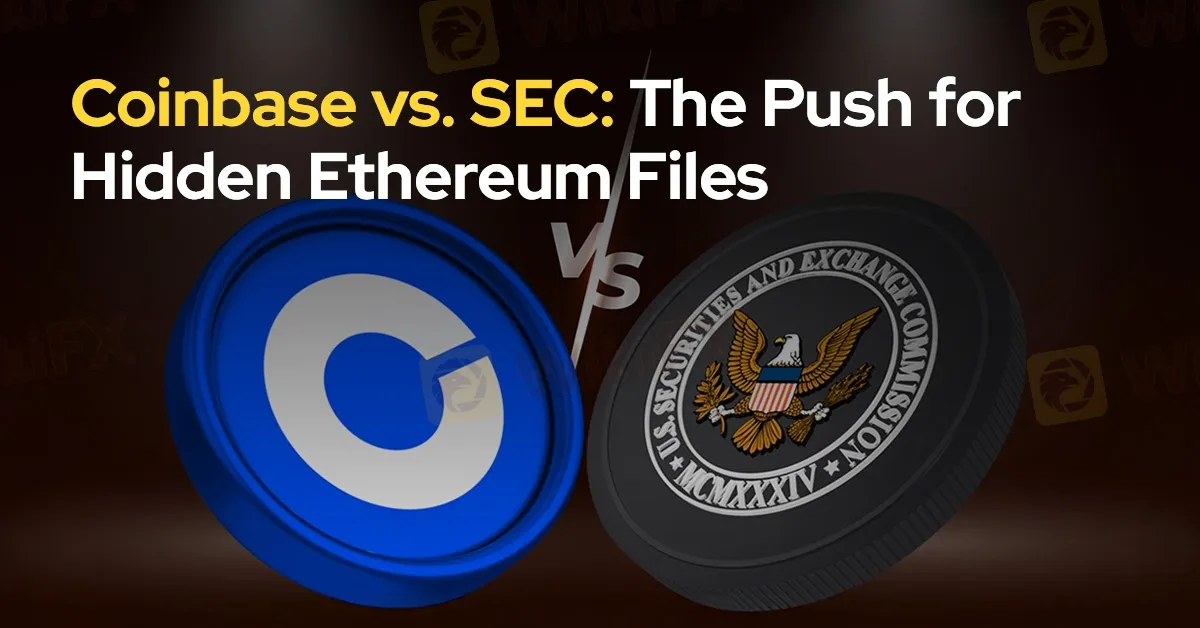简体中文
繁體中文
English
Pусский
日本語
ภาษาไทย
Tiếng Việt
Bahasa Indonesia
Español
हिन्दी
Filippiiniläinen
Français
Deutsch
Português
Türkçe
한국어
العربية
Coinbase vs. SEC: The Push for Hidden Ethereum Files
Abstract:Coinbase is seeking to compel the U.S. Securities and Exchange Commission (SEC) to release internal communications regarding the agency's views on Ethereum (ETH) and other digital tokens.

In an escalating legal dispute, Coinbase is attempting to compel the U.S. Securities and Exchange Commission (SEC) to disclose internal communications regarding its stance on Ethereum (ETH) and other digital tokens. The cryptocurrency exchange has requested that a federal judge determine whether it can access key SEC documents, which had previously been denied. These documents could shed light on how the regulator views the classification of certain cryptocurrencies.
Coinbases interest in these documents stems from ongoing discussions within the SEC regarding whether Ethereum and similar digital tokens should be classified as securities. This issue holds significant implications for the future of the cryptocurrency industry in the U.S., as the regulatory treatment of digital assets remains unclear under existing frameworks.
The legal move follows the SEC‘s initial refusal to comply with Coinbase’s request under the Freedom of Information Act (FOIA). Coinbase had sought information specifically related to communications about Ethereum 2.0, the upcoming evolution of Ethereum‘s blockchain network, in order to better understand the SEC’s position. When the SEC withheld the documents, citing an ongoing investigation, Coinbase initiated legal proceedings, accusing the regulator of obstructing efforts to obtain crucial information.

History Associates, representing Coinbase, has recently filed a notice with the U.S. District Court for the District of Columbia, indicating its intent to pursue partial summary judgment. Coinbase argues that the SEC‘s initial justification for withholding the documents may no longer be valid, given the regulator’s shifting narrative on cryptocurrency regulation.
While the SEC has declined to comment on this specific case, Coinbases legal efforts are part of a larger push for greater transparency and clearer regulatory guidelines for the cryptocurrency sector. In addition to this legal battle, Coinbase is also engaged in other disputes with the SEC, including accusations of operating an unregistered securities exchange. Furthermore, the company is advocating for the creation of cryptocurrency-specific regulations to provide clearer rules for the industry.
Coinbases broader argument is that the SEC has not yet established a coherent regulatory framework for cryptocurrencies. In 2022, the company filed a petition urging the SEC to develop rules that would provide clarity on how digital assets should be regulated. However, this petition was rejected by the SEC in December 2023, prompting Coinbase to seek judicial intervention.
As Coinbase continues its legal battle with the SEC, the outcome could have a significant impact on how cryptocurrencies like Ethereum are regulated in the U.S., potentially setting a precedent that could influence the wider digital asset market.

Disclaimer:
The views in this article only represent the author's personal views, and do not constitute investment advice on this platform. This platform does not guarantee the accuracy, completeness and timeliness of the information in the article, and will not be liable for any loss caused by the use of or reliance on the information in the article.
Read more

Crypto News: $1 Trillion Managed Funds Fail Key Compliance Tests
ASIC finds $1 trillion in managed funds failing compliance, risking investor protection with weak oversight on design, dispute resolution, and reporting.

Robinhood Launches Free Desktop Trading Platform for UK Investors
Robinhood launches its free desktop trading platform, Robinhood Legend, in the UK, offering advanced features for active investors, including 6,000 US stocks with no commissions.

Crypto Never Sleeps with Hantec Markets' 24/7 Trading
Hantec Markets has introduced round-the-clock cryptocurrency contracts for difference (CFD) trading, providing its clients with uninterrupted access to digital asset markets.

Hong Kong Approves Stablecoin Law to Boost Digital Finance
Hong Kong passes a stablecoin bill, launching a licensing regime for fiat-backed tokens to enhance digital finance and investor protection.
WikiFX Broker
Latest News
ASIC Urges Financial Licensees to Fix Register Errors Before 2026 Deadline
eToro Review 2025: Top Trading Opportunities or Hidden Risks?
How much money will you earn by investing in Vantage Broker?
IronFX vs Exness Review 2025: Comprehensive Broker Comparison
Fraudsters Are Targeting Interactive Brokers' Users with Lookalike Emails
Top Tips to Choose the Best Forex Broker in 2025
SEBI Notifies New F&O Rules for Investors - New Derivative Trading Limits & More Amendments
Interactive Brokers: Global Office Visits and Licensing Details
U.S. Jobs Data Released: A Potential Boost for Gold Prices
Everything you need to know about ADSS
Currency Calculator


